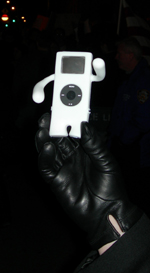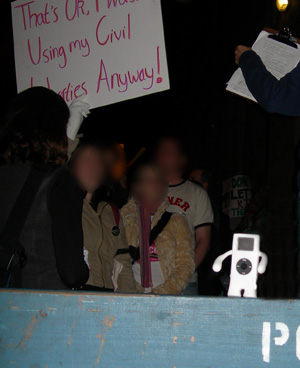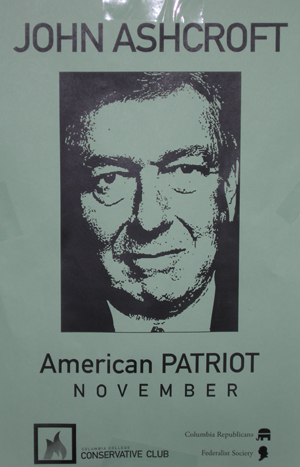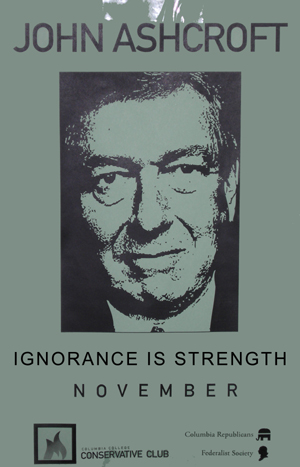[EXT. LERNER HALL, ~18:00]
 For your Three Years of Hell coverage of the Ashcroft protest and subsequent speech, we turn now to the TYOH roving reporter on the scene, Mr. iGor the iGuy. iGor?
For your Three Years of Hell coverage of the Ashcroft protest and subsequent speech, we turn now to the TYOH roving reporter on the scene, Mr. iGor the iGuy. iGor?
Thank you, Tony. It's a warm and rainless night here on Broadway. We'd been worried that yesterday's downpours might continue, dampening the enthusiasm of the anti-Ashcroft lobby. Luckily, the weather's been more merciful than a reprieve from Guantanamo. Indeed, it's fine weather for a protest, and these folks seem to be making the most of it.
What exactly are the protestors up to, iGor?
Well, as you can see, most of the protestors have been cordoned off by police barriers. A little earlier a policeman came over and tried to remove us from the boundary of the protest. I'm not sure if he was convinced of our journalistic credentials, but the main attraction seems to be a guy with a megaphone, so it didn't really hurt to back up a few feet. And there's all kinds of people outside the barriers in a variety of outrageous get up. For instance, there's a woman in Guantanamo Orange, which I get, and a guy walking around on stilts. I'm not sure what the latter is supposed to be symbolic of, precisely, but he's certainly visible. There's a lot of signs.
And what they're saying?
I've just gotten here, Tony, and I'm afraid the crew will have to leave to go inside the auditorium pretty soon, so we're going to miss the heart of the protest. Nevertheless, so far it seems fairly sedate. I have to admit to feeling let down by the posters. "I WASN'T USING THOSE CIVIL RIGHTS ANYWAY" or "DETAIN ASHCROFT," all things you'd find on a CafePress t-shirt.
When we arrived, someone was leading a chant . . . . it seemed like the old chestnut "THE PEOPLE UNITED SHALL NEVER BE DIVIDED." Nevertheless, some of the people were out here cordoned off by blue sawhorses and some of the people were standing in line over in Lerner Hall waiting to get in. To his credit, the speaker on the podium was advising his crowd to remain civil and remain respectful. He finished by saying something to the effect that while Mr. Ashcroft has the right to speak here, he'll never get the respect of the guy on the soapbox with the bullhorn.
Any reaction from the Ashcroft crowd?
I didn't get a chance to question Mr. Ashcroft about it. I can only imagine he's crushed not to have the respect of folks with blowhorns addressing crowds with signs that say he's a terrorist.
Earlier today we'd been hearing stories about protestors making a human wall around Lerner and various other obstructive ideas. Any sign of that?
Well, no, not really. Actually, the line of people trying to get into Roone Auditorium is far more impressive than the number of protestors outside. The protest may get a bit bigger while we're trying to get seats, Tony, but it looks like a few hundred people at most. And while some protest sympathisers are hopefully trying to get inside, the security rules attached to the invitation are quite strict: no audio recorders, no cameras, no bag larger than a purse, and no posters.
Thank you, iGor. We look forward to your reaction to the speech.
[INSIDE AUDITORIUM, AFTER SPEECH]
So, iGor, you've heard the big speech, what was it like?
I was pretty skeptical about Ashcroft coming into this, and I have to say I came out impressed. There wasn't a huge display of intellectual force on either side of the stage,[1] but Ashcroft was charming, and chatted about crime, terrorism, faith, and public service, and cracked a lot of jokes. Here's a guy who'd obviously faced a hostile crowd once or twice before. I think the high point for me was a bit of tete-a-tete . . . . I have to go from memory since I didn't have a recorder, but it went something like this:
GEN. ASHCROFT: [telling "old governors never die" jokes] And of course, old prosecutors never die, they just lose their...
HECKLER: Bill of Rights!
ASHCROFT: [folksy] Well, I haven't lost my Bill of Rights, and from the sound of you, young lady, you don't seem to have either.
There was a lot more of this kind of thing. I think it's fair to say that if a major speaker who's used to one-line zingers comes to Columbia again, the peanut gallery is going to have to get better ammunition. It was strictly amateur hour from the back bench, Tony.
So a solid conservative victory?
I'm going to have to say no there. I've got no neck, but if my body weren't made of silicone I'd be shaking my head in shame right about now. Ashcroft came off pretty well, but there seemed to be a battle between Columbia's left and right wings to see who could make themselves look dumber, and it's impossible to tell who won. Close victory on points, is all I can say.
Too much hooting from the audience?
Too much from the audience, too much from the stage. The Columbia Conservatives opened with a fifteen minute whine about how they're picked upon. Look, I know that there's more video games in the undergraduate lounge than there are Bush-voting faculty in the undergraduate campus, but this really wasn't the time to mention the political leanings of the professorate. The moderator seemed to be doing his level best to live up to the worst liberal parody of what a campus conservative could be. And the introduction of Ashcroft...
[pause] iGor?
Sorry. I was trying to see if this rubberized body could shudder. Endless repetitions of his patriotism, the difficulty of his job, the trying times. . . . Look, the man was an attorney general, a senator, and a governor. His resume spoke for him even before he opened his mouth. The moderator didn't need to put a dress on a pig and call it Monique.
That bad?
Worse. The whole thing was subtle as a chainsaw through a screen door. The conservatives deserved credit for reading out questions from groups like the ACLU, but they didn't need to provide such emphasis. Gloating merrily didn't make their enemies any more wrong, but it did make the hosts less gracious. And it didn't stop there. Interruptions of the speaker to make comparisons to Michael Moore. Complaints--presumably humorous--by the moderator that Gen. Ashcroft was stealing his limelight. Completely unnecessary demonizations of the anti-Ashcroft lobby, which was by that point making enough of a fool of itself waving about a big yellow sign they'd smuggled in. Really unnecessary.
What was the crowd reaction?
On my way out, I heard one of the more moderate audience members mutter with what I'd consider a wry chuckle: "This kind of event really could raise the level of civil discourse here at Columbia, if the ceiling had fallen in during the middle of the Q&A."
And your summary?
Well, they say that Mr. Ashcroft used to be in a barbershop quartet. Maybe in another venue, he could have brought down the house, but in this case he was really let down by the opening act.
[1]: UPDATE As Ex Post put it, "He made a great case for his policies, though I'm sure there is plenty critical to be said of his rather 'campaign speech' platitudes."






